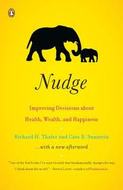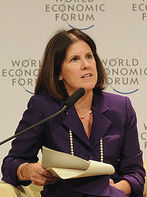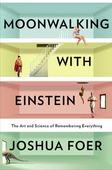|
I recently finished listening to the audio version of Nudge by Richard Thaler and Cass Sunstein. It was an enjoyable book, though it did have a majority of its background sections in common with other psychology books I've recently read having to do with natural biases and irrational decision-making. What I did like about this book was how it applied some basic principles to various areas of life, including managing money, saving for retirement, reaching health goals, and societal issues likes social security and organ donation. I think some of the suggestions in the book have a lot of weight, and I hope we implement them in the future.
I also liked their philosophy of libertarian paternalism, as it gels with some of my own personal thoughts on how choices and systems should be designed: giving people the right to choose but helping to "nudge" them in the right direction. Intro: The cafeteria
Part 1: Humans and Econs Ch. 1: Biases
Ch. 6: Save more tomorrow
Ch. 10: Prescription drugs
Ch. 13: Improving education
Ch. 16: Ideas
0 Comments
I had the true pleasure of hearing Suzanne Nora Johnson address my leadership class taught by former Mayor Riordan. She spoke of leadership, courage, and what has allowed her to succeed in business and philanthropic initiatives. I especially enjoyed hearing about her personal philosophies and which thinkers she takes to heart.
Johnson started her career as a lawyer and has worked in a variety of fields, including finance in the private and public sectors. In 2006, Forbes named her in its list of the 100 Most Powerful Women in the world. Most notably, Johnson worked as Vice Chairman of Goldman Sachs as Head of Global Marketing, from which she retired in 2007 to work on solving international problems. She now is Chairman of The Global Council on Financial Risk and on the boards of many large institutions including Pfizer, the Broad Foundation, and the Carnegie Institute. Johnson grew up in Chicago and had a large family with many first cousins. She went to USC and from there applied to law school. She clerked for a judge in the South to broaden her perspective and went on to practice law in New York for a couple years. She knew her goal longer term was to eventually work at the World Bank, so she applied to three investment banks to gain experience. That's what brought her to Goldman Sachs, where she eventually led the team to restructure emerging market debt. Compare and Contrast Johnson structured her talk by contrasting similar and often confused concepts.
Long-Term Philosophy
When I heard the Dean of UCLA Anderson mention Moonwalking with Einstein, I was caught off guard. The title was definitely unusual, and I had no idea what it was about. I knew it was about memory and psychology, and I figured it was worth a shot.
I was definitely in for a treat. The book follows the story of the author, who was a journalist in his twenties and got randomly into the "memory training circuit" and decided to give the techniques a shot by trying to see how well he could improve his memory. He ended up doing quite well: winning the US Memory Championship and making a lot of deep friendships with Mental Athletes (MAs) around the world. The book was a really fun read, and I definitely learned a lot about memory and the history of memory techniques. In addition, I loved the philosophical discussions about the role of memory and how important it is to develop and cherish it for our human nature. It's also inspired me to look into a lot of the primary sources mentioned within it and to perhaps try to train myself similar to how the author did. The only question is when I can find the time to do that.... Below are my main notes on the text. I definitely recommend this book to anyone interested in psychology, memory, and general displays of awesomeness and freakish nature. Ch. 1: The smartest man is hard to find
|
Archives
February 2023
Categories
All
Subscribe |



 RSS Feed
RSS Feed

